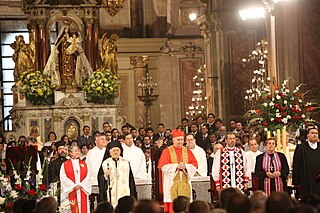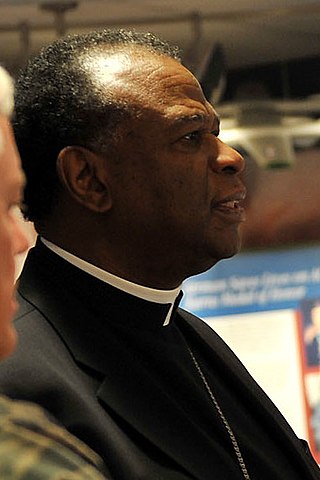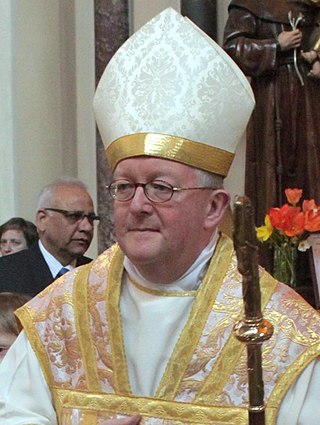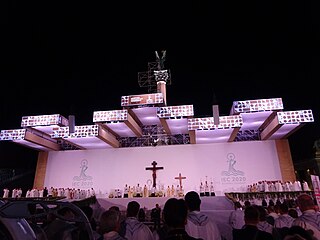An antipope is a person who claims to be Bishop of Rome and leader of the Roman Catholic Church in opposition to the legitimately elected pope. Between the 3rd and mid-15th centuries, antipopes were supported by factions within the Church itself and secular rulers.

The Holy See, also called the See of Rome, Petrine See or Apostolic See, is the central governing body of the Catholic Church and the Vatican City State. It encompasses the office of the pope as the bishop of the Apostolic episcopal see of Rome and serves as the spiritual and administrative authority of the worldwide Catholic Church and the city-state. Under international law, the Holy See holds the status of a sovereign juridical entity.

The Dicastery for the Doctrine of the Faith (DDF) is a department of the Roman Curia in charge of the religious discipline of the Catholic Church. The Dicastery is the oldest among the departments of the Roman Curia. Its seat is the Palace of the Holy Office in Rome. It was founded to defend the Catholic Church from heresy and is the body responsible for promulgating and defending Catholic doctrine.

The Catholic Church, also known as the Roman Catholic Church, is the largest Christian church, with 1.28 to 1.39 billion baptized Catholics worldwide as of 2024. It is among the world's oldest and largest international institutions and has played a prominent role in the history and development of Western civilization. The church consists of 24 sui iuris churches, including the Latin Church and 23 Eastern Catholic Churches, which comprise almost 3,500 dioceses and eparchies around the world. The pope, who is the bishop of Rome, is the chief pastor of the church. The Diocese of Rome, known as the Holy See, is the central governing authority of the church. The administrative body of the Holy See, the Roman Curia, has its principal offices in Vatican City, which is a small, independent city-state and enclave within the city of Rome, of which the pope is head of state and absolute elective monarch.

Jozef Tomko was a Slovak prelate of the Catholic Church who held positions in the Roman Curia from 1962 until he retired in 2007. He was prefect of the Congregation for the Evangelization of Peoples from 1985 to 2001 and president of the Pontifical Committee for International Eucharistic Congresses from 2001 to 2007. He was made a cardinal in 1985.
The hierarchy of the Catholic Church consists of its bishops, priests, and deacons. In the ecclesiological sense of the term, "hierarchy" strictly means the "holy ordering" of the church, the Body of Christ, so to respect the diversity of gifts and ministries necessary for genuine unity.
The Anglican–Roman Catholic International Commission (ARCIC) is an organization created in 1969 which seeks to make ecumenical progress between the Anglican–Catholic dialogue. The sponsors are the Anglican Consultative Council and the Pontifical Council for Promoting Christian Unity.

In the Catholic Church, a Eucharistic congress is a gathering of clergy, religious, and laity to bear witness to the real presence of Jesus in the Eucharist, which is an important Catholic doctrine. Congresses bring together people from a wide area, and typically involve large open-air Masses, Eucharistic adoration, and other devotional ceremonies held over several days. Congresses may both refer to National and International Eucharistic Congresses.

Piero Marini is a Roman Catholic archbishop who is president emeritus of the Pontifical Committee for International Eucharistic Congresses. For twenty years he served as Master of Pontifical Liturgical Celebrations, in charge of the Office for the Liturgical Celebrations of the Supreme Pontiff. In that capacity he worked for Popes John Paul II for 18 years and Benedict XVI for two years.

The Catholic Church has engaged in the modern ecumenical movement especially since the Second Vatican Council (1962–1965) and the issuing of the decree Unitatis redintegratio and the declaration Dignitatis humanae. It was at the Council that the Pontifical Council for Promoting Christian Unity was created. Those outside of the Catholic Church were categorised as heretics or schismatics, but in many contexts today, to avoid offence, the euphemism "separated brethren" is used.

Edward Kenneth Braxton is an American Catholic prelate who served Bishop of Belleville from 2005 to 2020. Braxton previously served as an auxiliary bishop of the Archdiocese of St. Louis from 1995 to 2000 and Bishop of Lake Charles from 2000 to 2005.

The Roman Catholic Metropolitan Archdiocese of Lahore is a Latin Metropolitan Archdiocese in Punjab province, Pakistan.

John Olorunfemi Onaiyekan is a Nigerian prelate of the Catholic Church. He was archbishop of the Latin Church archdiocese of Abuja from 1994 to 2019 and was made a cardinal in 2012. He has served as president of the Christian Association of Nigeria, president of the Catholic Bishops' Conference of Nigeria and bishop of Ilorin.

John Denver Faris is an American Chorbishop of the Syriac Maronite Church of Antioch, serving the Maronite Catholic Eparchy of Saint Maron of Brooklyn, headquartered in Brooklyn, New York. He is a canon lawyer of the Eastern Catholic Churches, and an expert called upon for dialogue between the Catholic Church and the Eastern Christian Churches.

Bernard Longley is an English prelate of the Roman Catholic Church. He was named the Archbishop of Birmingham on 1 October 2009, and installed on 8 December 2009.
The Anselmianum, also known as the Pontifical Athenaeum of Saint Anselm is a pontifical university in Rome associated with the Benedictines. It offers courses in philosophy, theology, liturgy, monastic studies, languages, sacramental theology, and the history of theology.

Luis Antonio Gokim Tagle is a Filipino prelate of the Catholic Church currently serving as the Pro-Prefect for the Section of First Evangelization of the Dicastery for Evangelization since June 5, 2022, and as the President of Interdicasterial Commission for Consecrated Religious since December 8, 2019. He was the 32nd Archbishop of Manila from 2011 to 2020. Tagle is the Cardinal-Bishop of San Felice da Cantalice a Centocelle and also serves as the President of the Catholic Biblical Federation, Grand Chancellor of the Pontifical Urbaniana University, and as a member of various departments and dicasteries in the Roman Curia.

2016 International Eucharistic Congress was the 51st edition of the International Eucharistic Congress (IEC) which took place from January 24–31, 2016 in Cebu City, Philippines. A convention center, the International Eucharistic Congress Pavilion, was constructed for this occasion. Pope Francis sent Cardinal Charles Maung Bo of Myanmar as his papal legate and presider at the opening Mass on January 24.

The 2021 International Eucharistic Congress was the 52nd edition of the International Eucharistic Congress (IEC) which took place in 2021 in Budapest, Hungary. The one-week event held regularly since 1881 celebrates the Real presence of Christ in the Eucharist according to the teaching of the Catholic Church.

The 28th International Eucharistic Congress was held in Chicago, Illinois, United States from June 20 to 24, 1926. The event, held by the Catholic Church, was a eucharistic congress, which is a large scale gathering of Catholics that focuses on the Eucharist and other items of Catholic faith. The event was organized by Cardinal George Mundelein, the Archbishop of Chicago, and was the first International Eucharistic Congress held in the United States and the second held in North America. Cardinal Giovanni Bonzano served as the papal legate for the event. The event attracted a large number of people to the city, with most sources claiming at least several hundred thousand attendees. Large events were held throughout the area, at locations including Soldier Field, Holy Name Cathedral, and the Saint Mary of the Lake Seminary. Some sources claim that approximately 1 million people attended the closing day mass held at the seminary in nearby Mundelein, Illinois.















